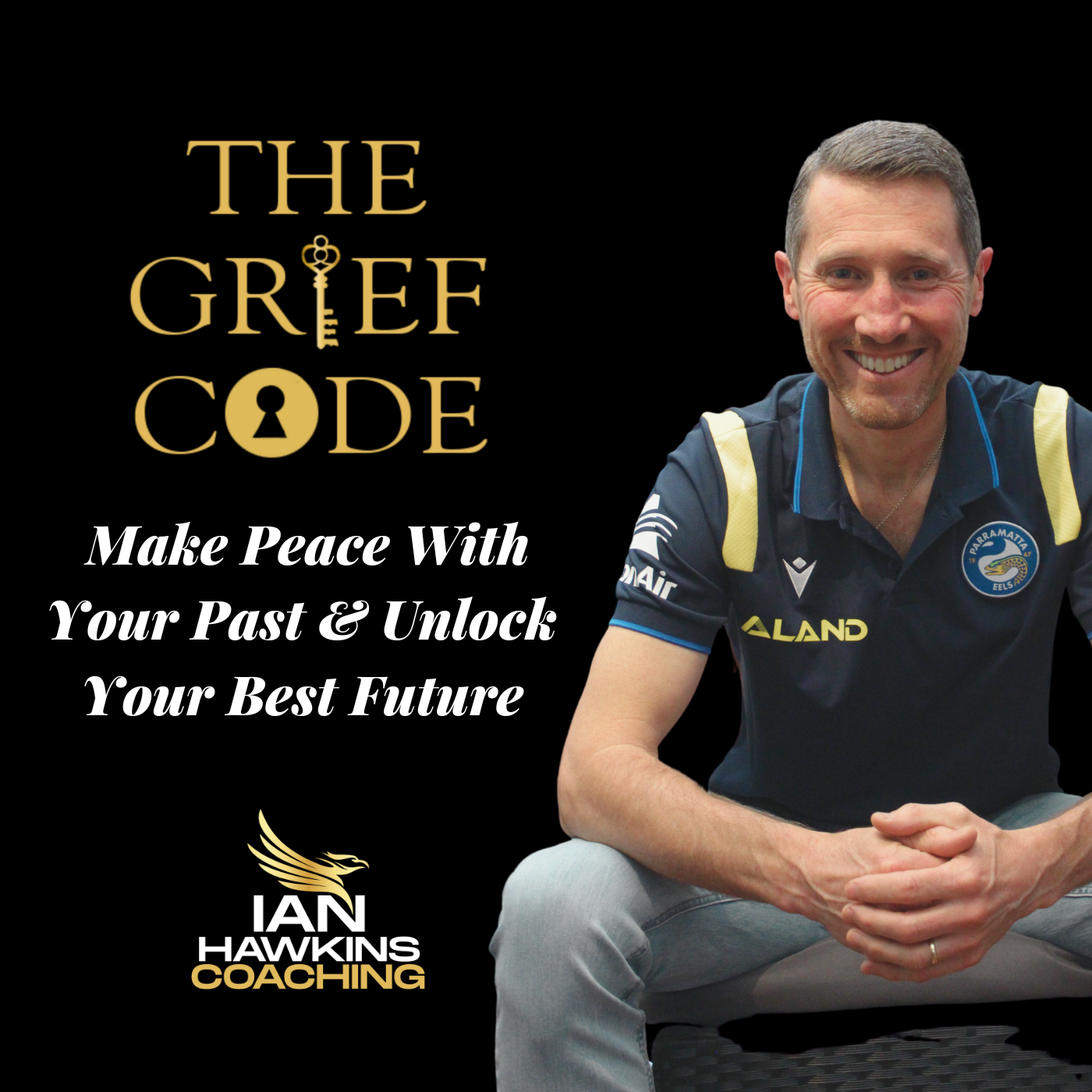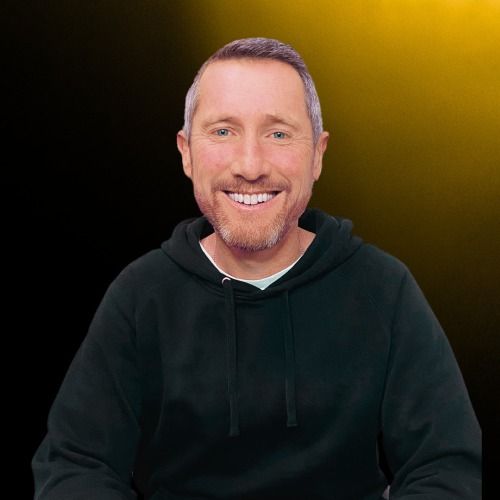Episode 377
Ep 377 - Feeling Responsible For Other People's Emotions
Episode Summary
In this episode, Ian emphasises how your behaviour impacts other people’s emotions.
- Understand that when you take responsibility for your own emotions, it gives you power.
- Learn the difference between regulating emotions and emotional regulation.
- Discover how journaling can serve as a stepping stone; it might not be the final answer, but it will give you a head start in the design process.
.
Heal your unresolved and unknown grief: https://www.ianhawkinscoaching.com/thegriefcode
About the Host:
Ian Hawkins is the Founder and Host of The Grief Code. Dealing with grief firsthand with the passing of his father back in 2005 planted the seed in Ian to discover what personal freedom and legacy truly are. This experience was the start of his journey to healing the unresolved and unknown grief that was negatively impacting every area of his life. Leaning into his own intuition led him to leave corporate and follow his purpose of creating connections for himself and others.
The Grief Code is a divinely guided process that enables every living person to uncover their unresolved and unknown grief and dramatically change their lives and the lives of those they love. Thousands of people have now moved from loss to light following this exact process.
Check Me Out On:
Join The Grief Code Facebook group: https://www.facebook.com/groups/1184680498220541/
Facebook: https://www.facebook.com/ianhawkinscoaching/
Instagram: https://www.instagram.com/ianhawkinscoaching/
LinkedIn: https://www.linkedin.com/in/ianhawkinscoaching/
Start your healing journey with my FREE Start Program https://www.ianhawkinscoaching.com/thestartprogram
I hope you enjoyed this episode of The Grief Coach podcast, thank you so much for listening.
Please share it with a friend or family member that you know would benefit from hearing it too.
If you are truly ready to heal your unresolved or unknown grief, let's chat. Email me at info@ianhawkinscoaching.com.
You can also stay connected with me by joining The Grief Code community at www.ianhawkinscoaching.com/thegriefcode and remember, so that I can help even more people to heal, please subscribe and leave a review on your favourite podcast platform.
Transcript
Ian Hawkins 0:02
Are you ready, ready to release internal pain to find confidence, clarity and direction for your future, to live a life of meaning, fulfillment and contribution to trust your intuition again, but something's been holding you back, you've come to the right place. Welcome. I'm a Ian Hawkins, the host and founder of The Grief Code podcast. Together, let's heal your unresolved or unknown grief by unlocking your grief code. As you tune into each episode, you will receive insight into your own grief, how to eliminate it, and what to do next. Before we start by one request, if any new insights or awareness land with you during this episode, please send me an email at info at the Ian Hawkins coaching.com. And let me know what you found. I know the power of this word, I love to hear the impact these conversations have. Okay, let's get into it.
When you're growing up, you hear messages from parents, teachers, siblings, saying, You made me angry, you made me sad, you made me happy, you made me all sorts of different things, right? So you're told that your behavior impacts other people's emotions. And then that plays out in later years in a really confusing way. And I'll explain how. So when that's what you've experienced, you've witnessed, you then create a pattern of, oh, I don't want to upset anyone. I do want to make them happy. I like doing that. But I don't make them angry, I only make them sad. So you change your behavior. To your own detriment, you're suddenly operating from a place of what other people want. Now, of course, in relationships, there is elements of wanting to be able to behave in a certain way and come at relationships in a certain way that do bring joyful situations, but not to the point where you are responsible for how other people feel. Because how other people feel has got to do with what's going on for them their own reaction to something else. So if you think about it now, like even now, if you're saying certain things, and a parent perhaps is what are your parents is reacting to you saying, Oh, that's really upset me? Well, you're an adult, they're an adult, if you're saying something that's upsetting them. That's because there's something going on for them that's been triggered by whatever you said, to have that ability to not be influenced by other people's stuff at all, is so freeing. So someone comes at you with something with anything good, bad, or anywhere in between, and for you just to be able to stay balanced and regulated without feeling the need to react in a negative way. Imagine what that would be. Now, granted, I don't get this right every time. But I have invested a fair bit of my time and energy into reacting in a positive way, not just outwardly, because I didn't do that as well. But what that doesn't do is it doesn't process what's going on within your system. So I might have been bringing out more energy where I not necessarily reacting negatively. But on the inside was like my whole system doing backflips and tumble turns and all sorts of different things that just felt awful, trying to force that emotion down. But when you can get to the point where you are only taking responsibility for your own emotions, for how any, anything that goes on unfolds, how you are going to react, then it changes everything. Because responsibility gives you back your power. It gives you back the self control. And it gives you back the ability to make changes. Now if you grew up being particularly empathetic, so you really sensitive to other people's stuff, then you're going to be particularly responsible for other people's emotions, to the point where constantly when you're going through situations where the situation may not have even been that bad. You'll be second guessing everything or that I say something that upset them. Did I say the right thing? Should I have been more assertive, should I have been more passive? And then you start having this inner conversation that it just feels that overthinking that I talked about so often because of this pattern of feeling responsible Because the pattern is so high and wide from a young age, you probably had parents that did the same thing. add to the confusion with the told how to feel. They'd be upset, they'd be angry. So you can see how it is going to have this internal battle going on between all of these different thoughts around emotions, what should be what shouldn't be exhausting, right? Because when you've got all of these different patterns of behavior they contradict, and then all these beliefs that also contradict, we can see why the voice in your head can get so confusing, confused, flighty, jumping from one thing to the next, can't get focused, can't get clarity. Well, the good news is you can change. And the first step, of course, he's taking responsibility, which I've talked to you guys a lot about, then it's being able to regulate your own emotions. So I've mentioned a couple weeks ago that emotion, energy in motion, being able to move the emotion through your body. First step is awareness. How often when you are faced with certain circumstances, where you're starting to second guess yourself, because you're worried about you might have upset someone. Imagine how you well not imagine, just remember how exhausting that is, whenever you do that, whenever you second guessed different situations, you feel like you said the wrong thing or got something wrong. And then you repeat the conversations in your head, you play them out again and again. And then what usually happens is that a whole lot of other situations from your past come flooding to the surface, anything related to the current situation, and it just sort of crashes down on your wave after wave. You can start to see now why there are days when things don't quite go as planned. And you might not feel as good as what you do on other days. It's a well, that inner voice, that you feel like you've got a hold over different times and will just come racing back with all of this stuff from the past. Triggered by some somewhat insignificant moment in the present or not so distant future, an event from previous to from earlier in the day or from previous days. Like I said, awareness is first, the first point, journal on the awareness record when you got it right record when you get it wrong chord some of those conversations you have with yourself. And, as always, if you are not sure how to do the regulating part, then meditation is a great place to start. Journaling is a great place to start. They're not going to give you all the solutions, they're going to be a great place for you to get moving in the right direction. And if you want any more support strategies with that, then of course reach out. The start now training that's it's on this week, when this episode was released, you can jump into that by jumping on to my facebook and join that group or like I said, not too distant future, that training will be available on the website on the front page. At the bottom of the page, there'll be a separate page for you to access that as well. It's going to help you start to be able to take that responsibility back. To be able to deal with that inner voice to start feeling that hunger for more and then putting together a strategy to make that more come to life, the structure to make it happen. And the ability to be able to take whatever steps you need to to bring all of what it is that you really desire into your life. starts with awareness.
I hope you enjoyed this episode of The Grief Code podcast. Thank you so much for listening. Please share it with a friend or family member that you know would benefit from hearing it too. If you are truly ready to heal your unresolved or unknown grief, let's chat. Email me at info at Ian Hawkins coaching.com You can also stay connected with me by joining the Grief Code community at Ian Hawkins coaching.com forward slash The Grief Code and remember, so that I can help even more people to heal. Please subscribe and leave a review on your favorite podcast platform

